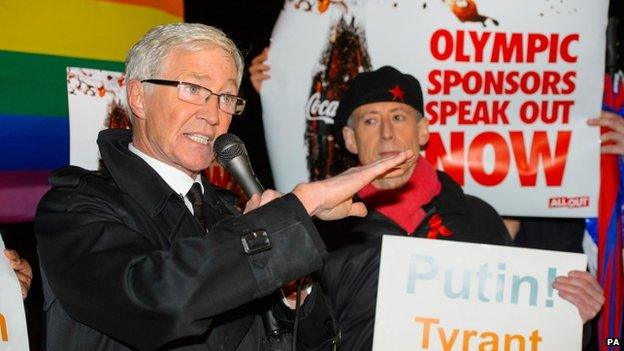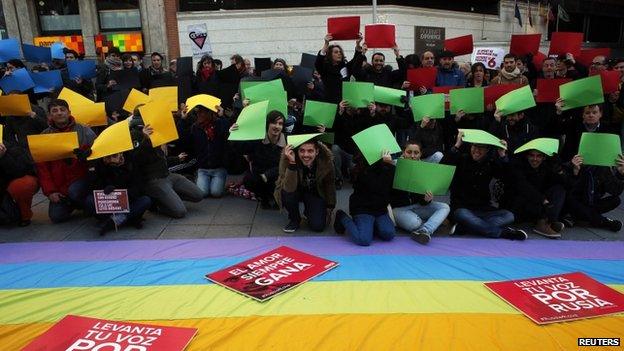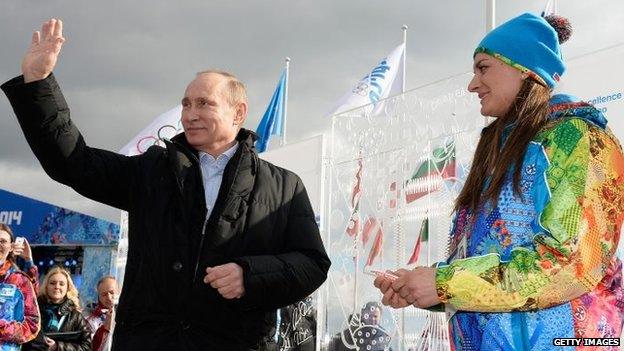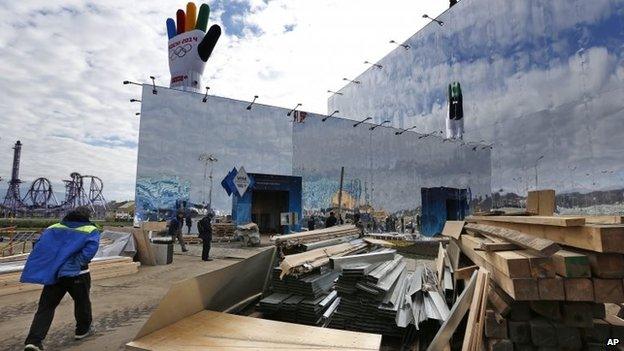Sochi 2014: Gay rights protests target Russia's games
- Published
Watch: The torch arrives in Sochi, where it will spend three days ahead of the opening ceremony
Gay rights activists across the world have been holding a day of protests against the Russian government, just two days before the Winter Olympics begin in the southern resort of Sochi.
The protests seek to persuade sponsors of the event to speak out over Russia's controversial laws on homosexuality.
The gay rights protests were organised in 19 cities, external around the globe.
The Olympic torch has arrived in Sochi, having visited 135 cities in the 122 days since leaving Moscow.
It will spend three days in and around Sochi before arriving in the Olympic stadium to light the Olympic cauldron during Friday's opening ceremony.
Growing disquiet
Wednesday's protests took place in cities including Melbourne, London, Paris and St Petersburg, with more expected during the evening.
Activists want Olympic sponsors such as McDonald's, Coca-Cola, Samsung and Visa to speak against Russia's new laws on homosexuality.
Protesters in Jerusalem chant: "No excuses, homophobia is terror"
Last year, Russia banned the promotion of "non-traditional" sexuality - widely seen as an attack on gay rights.
The law makes providing information on homosexuality to under-18s a crime, punishable by a fine.
Critics say its loose interpretation effectively stops gay rights protests in Russia.
Marie Campbell, a director at the equality campaign group All Out, told the BBC that the new Russian laws went against the spirit of the Olympics.
"All our members, as well as everyone else around the world, want to celebrate the Olympic values of personal strength and endurance and integrity," she said.
"All we are saying is that we can't just ignore the fact that this is happening in Russia where these anti-gay laws are preventing the Olympic values being lived and enjoyed by millions of people."

TV presenter Paul O'Grady and political campaigner Peter Tatchell took part in the rally in central London

Protesters in Madrid held up sheets of card in the colours of the Olympics rings
In a corporate blog post, external, AT&T condemned Russia's stance, saying it stood "against Russia's anti-LGBT [lesbian, gay, bisexual and transgender] law".
The telecommunications giant is not an IOC sponsor but it does sponsor the US Olympic Committee.
Last month, President Vladimir Putin said homosexuals would be welcome in Sochi for the Olympics but added: "Just leave the children in peace."
"We don't have a ban on non-traditional sexual relations," he said. "We have a ban on the propaganda of homosexuality and paedophilia."
Unfinished hotels
Meanwhile, President Putin has arrived in Sochi amid growing disquiet about whether preparations will be complete by Friday.
Hundreds of visitors arriving this week found that their hotels were unfinished.

Russian President Vladimir Putin has been visiting athletes settling into the Olympic Village

International journalists arriving in Sochi are reporting unfinished Olympic facilities and hotel rooms
The BBC's Daniel Sandford in Sochi says that while the venues themselves appear complete, the areas around them still resemble building sites.
Our correspondent says that what President Putin had hoped would be a showcase event is still proving to be a headache.
The estimated cost of the Games has soared from $12bn (£7bn) to over $50bn.
The ratings agency Moody's released a report, external on Wednesday suggesting Russia was unlikely to receive an overall macroeconomic boost from the event - something which, correspondents say, President Putin had banked on.
It said Sochi and the surrounding area would struggle to maintain Olympic facilities after the event, and it was unclear whether they would receive the hoped-for boost in tourism revenues.
Addressing journalists in Sochi on Tuesday, Mr Putin insisted that the enormous construction effort to prepare the city for the games had greatly improved the environment.
However, environmentalists have accused the Russian authorities of damaging the area during construction for the games.
- Published27 January 2014
- Published17 January 2014
- Attribution
- Published11 December 2013
- Published12 August 2013